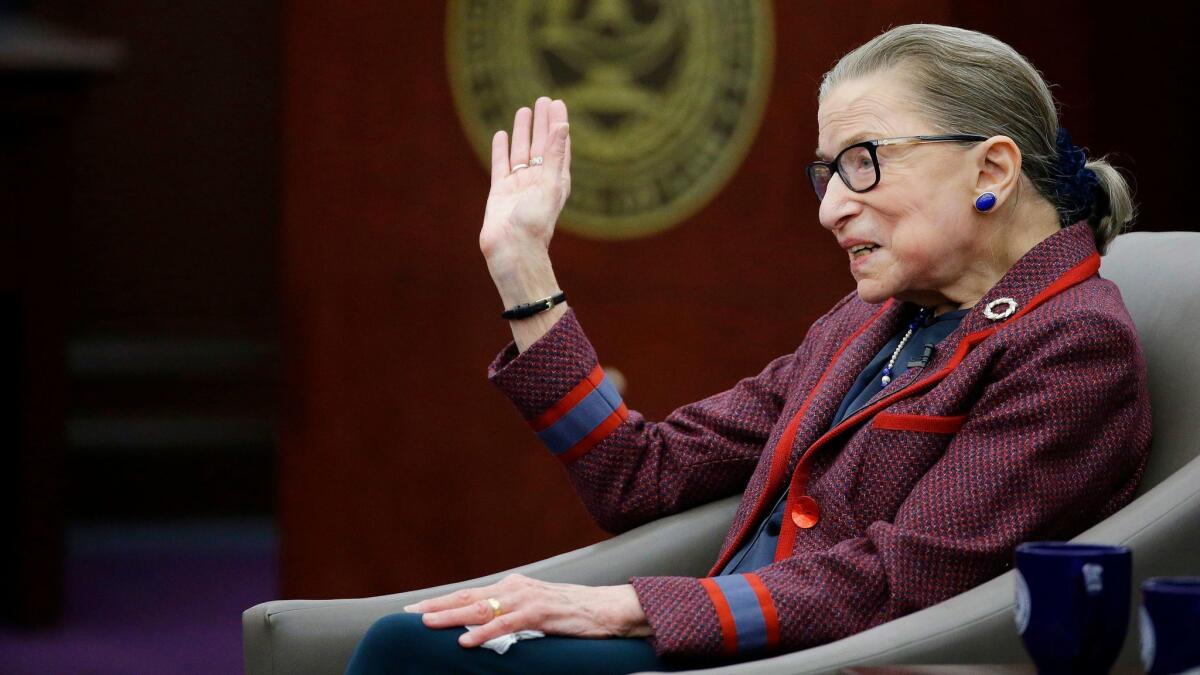Op-Ed: Stop treating Ruth Bader Ginsburg — a.k.a. ‘Notorious R.B.G.’ — like a celebrity

Maybe, just maybe, the left should tone it down with the worship of Supreme Court Justice Ruth Bader Ginsburg — a.k.a. “Notorious R.B.G.”
Last week, Adam Liptak of the New York Times wrote about being on tour with Justice Ginsburg, whom the headline declared a “judicial rock star.” Ginsburg is celebrating her 25th anniversary on the court by traversing the country, telling stories, fielding questions from sympathetic interviewers and generally basking in the adulation of crowds who see her as a judicial hero.
In many respects, Ginsburg is a judicial hero. She was the leading lawyer for women’s rights before she joined the bench. She has spoken forcefully and authoritatively for the liberal wing of the court on abortion rights, voting rights and affirmative action. She has been remarkably transparent about issues related to her health and age. And she hasn’t been afraid to admit, publicly, when she has made a mistake.
But there is something disconcerting about Supreme Court justices becoming political rock stars, particularly in this polarized era. We’ve divided the Supreme Court into teams. We have our justices, champions who push our side’s agenda. The other side has their justices, villains intent on destroying America.
We can blame the late Justice Antonin Scalia for reinventing the notion of the celebrity justice and paving the way for this kind of excess.
In the 1960s, some justices, such as William O. Douglas and Arthur Goldberg, made frequent appearances and were considered public figures. For the most part, they didn’t relitigate the court’s business in public.
When Scalia got to the Supreme Court, in 1986, he revived the role of justice as public intellectual. Over the three decades that he was on the bench, Scalia made many appearances, gave speeches and went on book tours. But, unlike Douglas and Goldberg, he pushed his particular brand of jurisprudence — and was known to insult and demean the theories of the other justices. In public, he was provocative and acerbic.
Just this week, despite swearing off political statements, Ginsburg said sexism played a prominent role in Hillary Clinton’s election defeat.
Asked about the Supreme Court’s controversial decision to end the 2000 presidential election in favor of George W. Bush, he told his liberal questioners to “get over it!”
He excoriated the notion of a “living Constitution” — a theory behind the Supreme Court’s recognition of the right of same-sex couples to marry — and the justices who practiced it, saying he liked his Constitution “dead, dead, dead.”
Scalia may become an even bigger conservative hero in death than he was in life. A collection of his speeches has become a best seller, and President Trump promised to appoint more “Scalias” to the bench.
Now Ginsburg has taken up the mantle of the court’s most provocative public justice. She is not afraid to share provocative political opinions. She has dropped hints about upcoming decisions. She called Colin Kaepernick’s protest of racial injustice by kneeling during the national anthem “dumb and disrespectful,” remarks for which she later apologized.
Most controversially, she repeatedly expressed concern in 2016 that Trump might be elected president — statements that raised serious issues about whether she needed to recuse herself from cases involving his campaign, and for which she also apologized.
As her public persona has grown, Ginsburg has embraced the “Notorious R.B.G.” label. She’s encouraged a cult of worship to grow up around her. There’s hagiography like the “Notorious RBG” book and the “The RBG Workout,” an illustrated book by her personal trainer. There’s a Ginsburg tumblr and Ginsburg T-shirts.
Just this week, despite swearing off political statements, she said sexism played a prominent role in Hillary Clinton’s election defeat. That may be true, but a sitting Supreme Court justice should not be weighing in on such questions.
It’s dangerous for Supreme Court justices to assume such political roles, particularly when faith in our institutions is declining. If justices are going to be public figures, they should do so in ways that reinforce the rule of law, not partisan politics.
Justice Neil Gorsuch took a victory lap of sorts recently, making an appearance with Senate Majority Leader Mitch McConnell. Increasingly, conservative justices like Gorsuch and Samuel Alito make regular appearances at events held by the Federalist Society, a key organization and network of conservatives and libertarians closely allied with the Republican Party. Some justices on the left, including Ginsburg and Stephen Breyer, appear at events held by the American Constitution Society, the liberal counterpart.
But no sitting liberal justice has appeared at a Federalist Society annual meeting, and no sitting conservative justice has appeared at an ACS annual meeting.
I’d like to see Ginsburg at a Federalist Society event, and Alito at an ACS event. More than this, I’d like to see other justices take up retired Justice Sandra Day O’Connor’s work on civic education, helping young people understand the importance of an independent judiciary. The justices should speak to poor and minority high school students, as Justices Clarence Thomas and Sonya Sotomayor have done.
Justice Ginsburg is a hero. She deserves our thanks for her exemplary service. But the left needn’t turn her into a god and conservative justices into devils.
Richard L. Hasen is a professor of law at UC Irvine School of Law and the author of “The Justice of Contradictions: Antonin Scalia and the Politics of Disruption.”
Follow the Opinion section on Twitter @latimesopinion or Facebook
More to Read
A cure for the common opinion
Get thought-provoking perspectives with our weekly newsletter.
You may occasionally receive promotional content from the Los Angeles Times.










